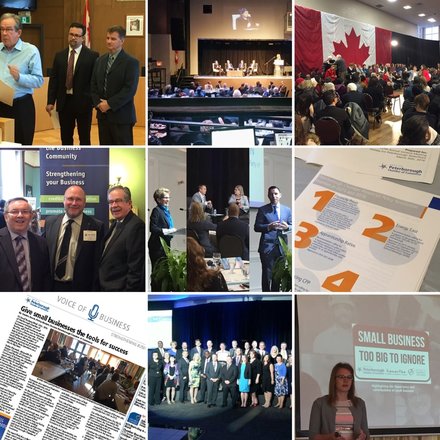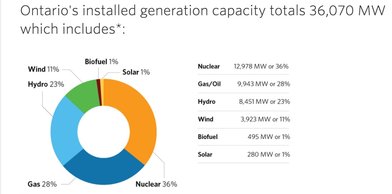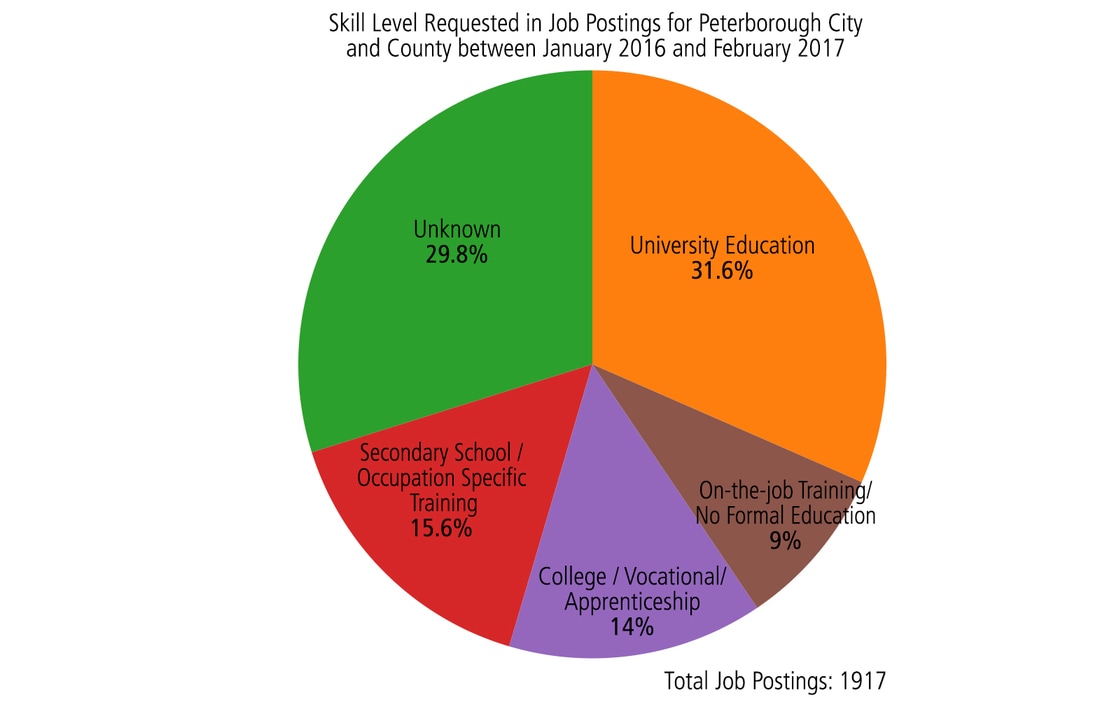|
There was a time that golfing was the bastion of the 'C' suite executives, always male and usually exclusive, and known as the best place to get the deal done.
Nowadays, there is less pressure on a golf game to deliver the deal, there are more and more women on the links, and golf courses are more accessible than ever. Business golfing is now an invaluable networking tool that is open to all. Here's why a few lessons to get your handicap down might get you far:
Can I say a 'slam-dunk'? Author: Karen August is the Manager of Membership Services for the Peterborough Chamber of Commerce. She can be reached at [email protected] or 705.748-9771 x200  The federal budget was delivered March 22nd and as Hendrik Brakel from the Canadian Chamber of Commerce writes, “Budget 2017 is completely different [from 2016]-big deficits and economic uncertainty mean there is not much money for new programs or big announcements. But, there is far more detail around previously announced policies and programs.” Having the opportunity, through the Canadian Chamber of Commerce, to be in the budget lock up for economists I had the opportunity to pour over the budget for about five hours. Well, at the outset there are a couple of really key messages that fit right in Peterborough’s bailiwick. The first chapter of the budget starts by laying out the government’s Innovation and Skills Plan. Now, details are still to flow about this plan, but the fact that the federal government is talking about sectors that Peterborough is focussed on, such as clean tech, agri-food, and advanced manufacturing, is a good place to be. But, as we know, the devil is in the details. So, what are the details that impact Peterborough? Budget Initiative: Superclusters: $950 million over five years will be provided on a competitive basis to support a small number of innovative industries. The competition to determine which clusters to support will be private-sector led and will launch in 2017. These clusters could be advanced manufacturing, agri-food, digital technology, etc. Peterborough Perspective: The three suggested cluster sectors can be found in the strategic plan for Peterborough Economic Development (PED) and are also closely aligned with the work of the Innovation Cluster. As such, it would seem that a Peterborough supercluster could fit nicely with the goals of the federal government. Budget Initiative: Suite of funds for innovation including clean tech, strategic innovation and venture capital: The opportunities are for a range of businesses for scaling up; those specific to clean tech; and the innovation fund, which includes a focus on aerospace (another economic sector pillar under PED). Peterborough Perspective: Again, these types of programs and incentives speak to the core of what’s happening in the Peterborough economy right now. It will be important to see further details so that our Peterborough startups and young companies can take advantage. Budget Initiative: VIA Rail will receive $867 million over three years for operating and capital needs. Peterborough Perspective: While there is no mention specifically of the proposed High Frequency Rail project, the longer term funding for VIA Rail gives them the opportunity to focus on such projects. The Peterborough Chamber of Commerce stresses the importance of this project to the economy of the city and county, in that high frequency rail will open the area to new possibilities. We are also excited that the type of train VIA wants to use will have limited environmental impact. Budget Initiative: Innovative Solutions Canada Program: This will start next year and is modelled after the U.S. Small Business Innovation Research program. A portion of the $50-million funding from federal departments and agencies will be allocated towards early-stage research and development, late-stage prototypes and other goods and services from Canadian innovators and entrepreneurs. The hope is that the government will have access to the latest, most innovative products and services. Effort will also be made to encourage procurement from companies led by women and other underrepresented groups. Further details about initial participation and spending targets will follow in the coming months. Peterborough Perspective: Given the appetite for innovation and entrepreneurship in Peterborough, there are many companies that could take advantage of this program in the coming years. This kind of investment by a government goes a long way to giving a product or service some clout in the early going. This type of program was also encouraged by the Canadian Chamber and its Chamber Network. Budget Initiative: New permits and processing time under the Global Skills Strategy: Budget 2017 provides significant commitment to improving the access to talent from abroad including:
Budget Initiative: More money for workplace-integrated learning: $225 million over five years is earmarked to increase the number of workplace-integrated learning spaces from 3,750 to 10,000 per year for post-secondary students and graduates. Renewal of the Aboriginal Skills and Employment Training Strategy (ASETS): $50 million in 2017–18 and the reallocation of resources from other programming that support skills and training more generally. Peterborough Perspective: Over the past five years or so there has been a constant call for more integration between post-secondary institutions and employers. This opportunity could be very beneficial to strengthening these ties in Peterborough. The government is also looking to increase the number of part-time students, which could have a beneficial impact on the post-secondary institutions and the Peterborough knowledge base. There are some items that were increased, eliminated or require more detail:
 It’s March and as has been done for the past 127 years, the Peterborough Chamber of Commerce will host its Annual General Meeting (AGM) next week. The 128th AGM will feature Hendrik Brakel, Senior Director Economic, Financial & Tax Policy for the Canadian Chamber of Commerce (CCC) who will deliver a speech called Economic and Political Outlook 2017-2018: Canada in a Volatile World. We also take the time to reflect on the past year of advocacy work. The policy and advocacy efforts of your Peterborough Chamber of Commerce on behalf of the business community are the core work of the organization. With the help and support of our Chamber members, the Peterborough Chamber had four approved policy resolutions (two at the provincial level and 2 at the federal level); we published 52 issues of the Voice of Business page, executed the Small Business Too Big to Ignore campaign, and handled dozens of media enquiries on issues involving all levels of Government. As a result of a letter writing campaign and several meetings, Peterborough City Council is continuing with their Tax Ratio Reduction Plan. The approved policy resolutions to the Ontario Chamber of Commerce (OCC) were “Identifying the cost drivers behind Electricity Prices” and “Creating a Flexible Apprenticeship Program”. We also co-sponsored two others at the provincial level. The Peterborough Chamber Policy Committee and Board of Directors also approved the submission of two policy resolutions to the CCC on “Advancing Canadian Competitiveness using short line rail” and “Restoring Canada’s Innovation Competitiveness”. Both of these resolutions passed at the 2016 CCC AGM. The Peterborough Chamber also co-sponsored one other resolution. Our Small Business Too Big to Ignore campaign resulted in two round table discussions with 28 businesses, 6 Voice of Business articles, three reports, and a policy resolution for the 2017 OCC AGM in Sarnia calling on the Government to expand the Red Tape challenge to include a sector for Small Business. To connect our members with government the Peterborough Chamber hosted roundtables with MP Maryam Monsef, ON NDP Leader Andrea Horwath, WSIB, the OCC on electricity prices, the sharing economy, nuclear refurbishment, Small Business Too Big to Ignore, and VIA Rail. We participated in four OCC task forces, Queen’s Park Day, Peterborough Day at Queen’s Park, and the Ontario Economic Summit where the Premier answered our submitted question on hydro rates. We also recognize the importance of strengthening business through community. As such, we are members of the MP’s Jobs and Economic Development Council, the Mid-Size Cities project, Sustainable Peterborough, the Local Employment Planning Council, and Board Members of Peterborough Economic Development and the Innovation Cluster. In 2016 we established a new advocacy event. Called The Power Hour, this event brings together our four elected leaders for a one hour conversation and Q & A about business issues. We also seat one of our local municipal councillors at each table, giving everyone a chance to engage directly. This event replaced our annual Gala, and is representative of our efforts to shift our focus to the needs of our members and the barriers that they face. The Peterborough Chamber hosted the Shining Waters Rail initiative for 7 years. In 2016 it was recognized as the catalyst for a ground breaking proposal by VIA Rail to establish a new High Frequency Rail line between Quebec City, Montreal, Ottawa, and through Peterborough to Toronto, providing high frequency, high speed passenger rail service to four of Canada’s largest Cities. Highway 407 is one year closer to its 2020 completion, which will see our 2004 OCC policy resolution come to fruition with the completion of the 407 to the Highway 115/35 intersection. Finally, in an editorial published in our Voice of Business page we issued a public call for a more positive attitude, identifying the top ten opportunities for Peterborough and the people, companies and organizations driving them. The result was a call for a #TeamPtbo approach, which has been firmly established on local social media and constantly referred to by local community leaders. Thank you again to our members for their support, and the Policy Committee and Board of Directors for #strengtheningbusiness with us in 2016. Read the full Policy Report Card We’ll see you at the AGM!  Image from IESO Image from IESO A few weeks ago I had the opportunity to travel to Queen’s Park to talk about the impact of Cap and Trade on the business community. Before heading off, the Peterborough Chamber of Commerce distributed a brief survey on the issue to its almost 900 members asking for their thoughts on the Cap and Trade program. The survey was sent on a Thursday afternoon and by Friday morning we have almost 45 responses and 60 by the time the survey closed the following week. We believe the number of responses in that timeframe highlights the importance of the issue to the Peterborough business community. Of those who responded, 52.5% felt that cap and trade was not the best program to deliver results around reducing greenhouse gas (GHG) emissions, while 37.2% were unsure whether the program was the best measure. When it comes to energy bill impact, about 24% of respondents saw their hydro bill increase $25-$75 in January 2017. Over the course of a year that would be an extra cost to business of between $300-$900. At the same time, Peterborough has the potential to benefit from the Cap and Trade revenues with the clean tech emphasis at the new Trent Research and Innovation Park, as long as the funds generated are used as an incentive. While most of the respondents felt it was too early to tell the impact of the Cap and Trade program, many felt the money gained through the program should be returned through government grants, tax cuts or be used for other transparent measures to achieve a cleaner environment. A challenge on this front would be if the Cap and Trade auction for credits failed to generate the predicted amount of money. In its analysis of the program, the government plans to bring in about $2 billion a year through the Cap and Trade credit auctions. If those goals were not to be realized, what is Plan B? How is the money that is raised through the auction process with large emitters recycled back into the economy? In the end, the message we took forward to meetings with the Ministry of the Environment and Climate Change and with the Office of the Premier at Queen’s Park was around competitiveness. How do we keep Ontario competitive in a worldwide business market? The province took a very big step in 2004 by eliminating coal fired plants. As a result, the Ontario grid is cleaner than most including many of our neighbouring grids to the south. In Ohio, coal is used to generate 59% of the electricity in that state. In Michigan, natural gas is the main source of energy with coal second at 46.4%. In New York State, natural gas is the main energy source. While China has halted construction on new coal plants and is considering a push on renewable energy, the country’s dependence on coal continues with nearly 80% of its electricity generated with the fossil fuel. The challenge we see with the cost to business of the Cap and Trade program is that it is not creating an environment that celebrates our clean grid, but has the potential to push businesses onto dirtier grids in other markets to stay competitive. The increased attractiveness of dirtier grids also doesn't help achieve global goals around climate change. The provincial and federal governments are shouldering Canada and Ontario’s piece of the burden however, the question of how that change is managed is very important. In the recent Peterborough Chamber of Commerce survey, 90% of respondents were either against the program or unsure if a cap and trade program was the best option. If the province celebrates and incentivizes the use of Ontario’s cleaner grid, which still has capacity to meet demand, it will create the opportunity for more businesses, especially those in the clean tech space, to consider this province as a competitive place to set up shop.  I sit on the Skills and Workplace Development Policy Council at the Ontario Chamber of Commerce. The group has been brought together to examine the issues underlying the challenges businesses face in securing the skills and education they need for job openings. We will also discuss demographic changes in our population and how those changes will affect future workforces. As a member of the policy council I want to ensure the Peterborough perspective is heard. To that end and to learn more about the needs of Peterborough employers, I sent an email to the Workforce Development Board Help Desk on Thursday, February 16 asking the following: Do you have data that identifies which sectors and skills are most in demand for Peterborough City and County? Shortly thereafter, I had a six page report in my hands. According to the current labour market information (LMI) available: The top five industries, with Statistics Canada definitions, in search of employees are (# of job postings):
When it comes to skill level, employers are looking for varying levels of education (see the graph above). The LMI report shows that between January 2016 and February 2017 there were a total of 1917 jobs posted in the Peterborough City and County. 92.5% were in the City of Peterborough and range from Utilities and Construction opportunities to Retail Trade to Transportation and Warehousing to Finance and Insurance to Public Administration. The remaining 7.5% of jobs were in the surrounding townships and were mainly in Manufacturing, Retail Trade and Accommodation Services. In the past year, there were 572 postings that did not reference any education level. A recent Ontario Chamber of Commerce (OCC) survey found that:
business’ ability to invest and grow. Ultimately, you can never get TMI (too much information) with LMI and it’s a valuable tool to start assessing the skills needs of our workforce now and in the future. There’s an ad at the bottom of this page for the Workforce Development Board Help Desk - one of several strategies in the province when it comes to disseminating labour market information, and a tremendous resource. “The helpdesk can be used by community stakeholders to assist them with their Labour Market Information (LMI) needs,” says Jason Dennison, Manager of Operations.  Cover Art from CCC Report Ten Ways to Build a Canada that Wins Cover Art from CCC Report Ten Ways to Build a Canada that Wins The “Ten Ways to Build a Canada that Wins” list for 2017 from the Canadian Chamber of Commerce is an evolution of their annual list the “Top 10 Barriers to Canadian Competitiveness”. “This year’s list comes at a time of both challenge and opportunity for Canada,” says Perrin Beatty, President and CEO, Canadian Chamber of Commerce. “Canada possesses important advantages, including our rich resource inheritance, the skills and industry of citizens and our proximity to the world’s richest market. With imagination and plain hard work, we can translate these advantages into business success that will benefit every Canadian family.” Below is a summary of the list from the report:
|
AuthorThe Peterborough and the Kawarthas Chamber of Commerce acts as a catalyst to enhance business growth, opportunity, innovation, partnerships and a diverse business community. Archives
June 2024
Categories |
|
Copyright Greater Peterborough Chamber of Commerce. All rights reserved.
175 George Street North, Peterborough, ON, K9J 3G6 Phone: (705) 748-9771 | (705) 743-2331 Home | Calendar | Site Map | Privacy | Accessibility |
